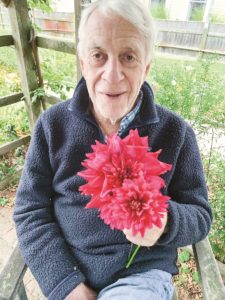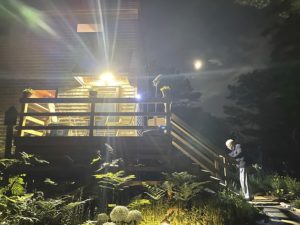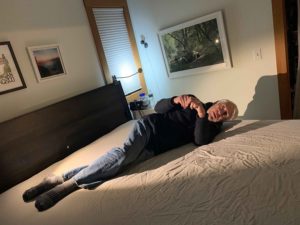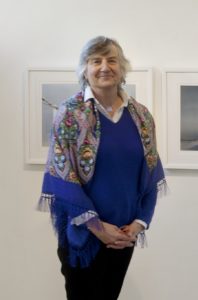PROVINCETOWN — Jane Paradise and her husband, Frank DiGirolamo, have dinner out at restaurants three times a week — at a minimum. They go to bed at midnight, and DiGirolamo sleeps until the afternoon. The rest of the day is taken up by walks through Provincetown’s streets and along its shores.
The couple has lived in Hong Kong, London, Toronto, and San Francisco. But now life is pared down to the essentials. That’s their response to DiGirolamo’s Alzheimer’s disease, which has been causing his slow cognitive decline since 2011.

You already know all this if you are one of Paradise’s 1,158 followers on Instagram, where, since the pandemic began, she has been posting photos that tell the story of life with DiGirolamo. You know what restaurants the couple like. You follow them on their trips to Napi’s, the Mews, and Mac’s Fish House.
Paradise has been pairing her photographs with brief snippets of dialogue between the two of them — Paradise, the reasonable one, and DiGirolamo, the wild card.
For example, on returning from dinner at Napi’s, Paradise shot a photo of DiGirolamo entering their house. You could interpret the dramatically lit garden and porch as a celebration of their continued nightlife. But Paradise paired it with this conversation:
Frank: “What are we going to do here? Just die here?”
Me: “What do you mean? Just die here?”
Frank: “No! I didn’t say that! You scare me!”
Me: “Sorry. I didn’t mean to.”
Another time, she photographed DiGirolamo lying across an unmade bed with this dialogue:
Me: “I need you to get your shoes on.”
Frank: “I’m waiting for me.”
Molly Perdue, co-founder of the Alzheimer’s Family Support Center of Cape Cod, said Paradise’s focus on her husband’s words captures something beautiful and insightful about the person who remains despite the disease.
Language is stripped away with Alzheimer’s, the most common form of dementia — which will hit 14 percent of adults over 71, according to the Alzheimer’s Association. An estimated 10,000 to 13,000 Cape Codders have dementia, Perdue said.
But the powerful need to connect with another human being forces its way through almost any language barrier.

“My mom had like 14 words left, but she could use those words with perfect timing and make everybody laugh at a dinner party,” Perdue said. With this disease, language becomes less concrete but more emotional, Perdue explained.
“The other night, we went to Fanizzi’s,” Paradise said, adding, “We rarely go there. Frank said, ‘We are here or not. We are usually not here.’ He was saying we never come here. You just have to begin to understand him. His language is stripped down.”
Paradise’s photographs show Provincetown’s endless gorgeousness, a boat filled with crates of clams at MacMillan Pier as the sun sets, quaint cottages covered in flowers, stretches of sand, and intimate scenes of the restaurants where they spend so much time.
“It is really important for Alzheimer’s patients to have routine,” Paradise said. “When we go out to dinner, he knows the bartenders. They know what he eats. They know what he drinks, so he does not have to ask.”
Sometimes Paradise takes photos of her husband, who is still handsome at 81.

But often the photos are just of Provincetown, and Paradise finds metaphors for DiGirolamo in those scenes.
Alzheimer’s was why they moved to Provincetown in 2015. They wanted a sense of community, Paradise said.
Before that, they lived in San Francisco, where they had met in 1992. The pair married in 1999. DiGirolamo started his own audio system company, which he eventually sold to Harman. He then worked as the chief executive officer for other audio companies. Paradise, 68, is a registered nurse but worked in computer security for years before taking up photography full-time.
Taking care of DiGirolamo is her main gig now. The walking is for exercise, and going out to eat is like their vacation, she said.
In the last four months or so, she has stopped leaving him alone.
He has periods of delusional thoughts, where he hallucinates that men, “those guys,” are entering the house. Usually, however, he stays happy as long as she is there, she said.
Paradise relies on two different caretakers so that she can get out of the house a few times a week, or even just read a book.
She said that she does not feel trapped, though “sometimes I feel stressed and tired.”
Right now, her stress has to do with an upcoming show of her photographs at her Boston gallery, Galatea Fine Art, in November. And a book of photographs of the Provincetown dune shacks is due for release in 2022 by Schiffer Publishing.

In the meantime, there is Instagram, where Paradise’s fans include many clients of the Alzheimer’s Family Support Center.
That center is Paradise’s go-to when she has questions or needs guidance.
“They are an invaluable resource for me,” she said, “and I refer people to them for help and support.”
On Saturday, Oct. 16, and Sunday, Oct. 17, the Alzheimer’s Family Support Center will hold its annual fundraiser, a virtual cultural day with speakers including Lisa Genova, the author of Still Alice, and Remember: The Science of Memory and the Art of Forgetting, and a screening of a feature-length documentary about Brewster journalist Greg O’Brien, who wrote the memoir On Pluto about his early Alzheimer’s diagnosis.
The cultural event is virtual and free, with donations requested. Sunday there will be a fundraising walk — with departures from various hubs for safe distancing, in Provincetown, Hyannis, Brewster, and Falmouth.
The fundraiser is the nonprofit’s big event of the year and typically brings in $125,000, Perdue said. The nonprofit’s budget was $550,000 in 2019, according to its latest tax filing.
More information is available at alzfamilysupport.org.



